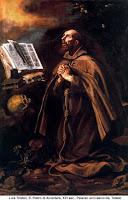 Saint Matthew says that because Joseph was a just man, he did not wish to defame Mary but was willing to take upon himself the suffering and to put her away. This is one of the proofs of true justice, which is always accompanied by mercy, as is the justice of God himself. God's own law put the knife in Joseph's hand, but Joseph renounced the right which he had before God. He chose to be merciful rather than rigorous, for he desired to be what he himself would wish God to be...
Saint Matthew says that because Joseph was a just man, he did not wish to defame Mary but was willing to take upon himself the suffering and to put her away. This is one of the proofs of true justice, which is always accompanied by mercy, as is the justice of God himself. God's own law put the knife in Joseph's hand, but Joseph renounced the right which he had before God. He chose to be merciful rather than rigorous, for he desired to be what he himself would wish God to be...Joseph realized how great was the blessing which God had bestowed upon him, a poor carpenter, in decreeing that from his house and family should come the hope and salvation and remedy of all generations and that he should be guardian and putative father of the Savior and the spouse of his blessed Mother. In addition to all this, the angel revealed the eminent sanctity and excellence of the Virgin and so changed Joseph's mind that he now held in the greatest reverence her whom he had suspected of evil.
When a heart so pure and holy sees itself enclosed and inundated by such mysteries, what must it feel? How astonished and enraptured it must be amidst such marvels and blessings, especially since the Holy Spirit usually gives to the just an experience or taste proportionate to the knowledge which he gives them. Since the Holy Spirit is substantial love proceeding from the Father and the Son, he is as much concerned with the will as with the intellect, and he moves it in conformity with the light which he gives to the intellect. Consequently, as nature does not make members that are out of proportion to each other, so that divine Spirit usually arouses acts of the will which are proportionate to the light in the intellect. This being the case, what must have been the state of Joseph's will when his intellect was enlightened concerning the great marvels and mysteries?
-Venerable Louis of Granada
Venerable Louis of Granada (1588) was a Spanish Dominican priest and a good friend of Saint Charles Borromeo.
No comments:
Post a Comment